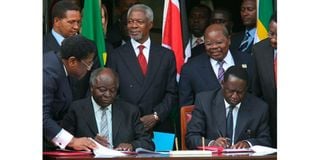Premium
Next year could be 2017 redux

President Mwai Kibaki (left) and Raila Odinga sign a power sharing deal on February 28, 2008 in Nairobi as then Tanzania's President Jakaya Kikwete, chief mediator the late Kofi Annan and Tanzania's former president the late Benjamin Mkapa look on.
What you need to know:
- Jubilee’s Uhuru Kenyatta disdains Mr William Ruto, his insolent deputy, with bile not seen since Sir Thomas More was executed.
- But it’s Mr Ruto who has scored the most biting – and vicious – jabs against Mr Kenyatta.
December 10, 2007 will live in my mind forever. On that day, I predicted Kenya was perilously careening towards civil war. Prof Ludeki Chweya and I were the duelling keynotes on ‘Politics and the 2007 Kenya elections’ at the Stanley Hotel Nairobi. The highfalutin intellectual meet was organised by the Kenya Human Rights Commission to celebrate the traditional International Human Rights Day.
In the room were some politicians and doyens of civil society. Let’s refresh your noggin. PNU’s Mwai Kibaki was locked in a do-or-die presidential contest with ODM’s Raila Odinga. The two foxes – nay, bulls – stared at each other from a deep political divide. It was clear to me none of them would blink, or concede defeat.
Mr Odinga believed the Deep State would rig him out. Mr Kibaki’s mandarins seemed determined to “re-elect” him come hell or high water. Rarely do African incumbent presidents “lose” elections. Mr Odinga had run a particularly effective campaign. He was indefatigable. He drew massive maniacal crowds wherever he went.
To pundits and pollsters – including chickens in the village – Mr Odinga was poised to redeem the long-suffering Odinga family by making them tenants in the State House. It was not to be. Late on election night, the count showed Mr Odinga with a virtually insurmountable lead against Mr Kibaki, the incumbent. But in the wee hours, the Meru vote poured into the portals of the defunct Electoral Commission of Kenya.
Right in front of our unbelieving eyes, Mr Odinga’s formidable lead went poof – evaporated. In the ensuing melee, ECK Chair Samuel Kivuitu mysteriously disappeared and then reappeared to swear in Mr Kibaki under the cover of darkness for the second, and final, term.
Island of tranquility
At the centre of the electoral debacle at the KICC – from where the results were announced – was none other than rambunctious Eldoret North MP William Ruto, then a stalwart in Mr Odinga’s ODM. Mr Ruto and ODM’s James Orengo faced off with PNU’s Martha Karua in a battle royale. Mr Odinga refused to concede and alleged Mr Kibaki had stolen the election. Mr Kibaki dug in. An orgy of unprecedented genocidal violence threatened to terminate Kenya.
Back to December 10, 2007. When I told the crowd at the Stanley that I saw in my crystal ball the 2007 election outcome as an existential threat to Kenya, I was panned by some in the crowd. Dr Chweya himself vigorously contested my characterisation of the coming Armageddon. He was appointed PS in the Grand Coalition Government following the post-election violence.
Dr Koki Muli, then director of the Institute for Education in Democracy and chair of the Kenya Domestic Observers Forum, rebuked me for thinking Kenya could descend into civil war. She pointedly said that Kenya wasn’t a failed state like Somalia. She had a point. Kenya was seen as an island of tranquillity in a sea of chaos.
I have a lot of respect for Dr Muli, but I thought she wasn’t utilising her vast scholarly and practical repertoire on elections and their consequences, especially in so-called fragile post-colonial states. We saw how the 2020 election in the US – one of the oldest established democracies – virtually threatened the leading state in the world. I told Dr Muli that states don’t fail until they do.
Explosive cocktail brewing
In my telling, it was naïve and jingoistic hubris to think that Kenya couldn’t collapse or come under severe distress the way Angola, Uganda, Ethiopia, DRC, CAR, Rwanda, Burundi, Liberia, Sudan, Libya, Egypt, Nigeria, Ghana, Zimbabwe, and many others had. There was nothing about Kenya to prevent such a tragic national cataclysm.
Fast forward to 2022. My analytical hat, if crystal ball, tells me that 2022 is shaping up to be 2017 redux. It could even be worse. We have an explosive cocktail brewing. You know the outline.
Jubilee’s Uhuru Kenyatta disdains Mr Ruto, his insolent deputy, with bile not seen since Sir Thomas More was executed – by beheading – in 1535 for refusing to take the Oath of Royal Supremacy. Mr More went from being King Henry VIII’s trusted adviser to having no head.
Mr Ruto finds himself in a similar predicament, except his beheading so far has been political, not biological. Both he and his boss trade the vilest attacks daily. Mr Ruto has lost all respect for Mr Kenyatta.
But it’s Mr Ruto who has scored the most biting – and vicious – jabs against Mr Kenyatta. Mr Ruto has a messianic complex and believes the presidency belongs to him as of 2022. He’s convinced he’s God’s gift to Kenya and that anyone standing in his way to the presidency is a heretic like Mr More.
Mr Kenyatta has vowed that only over his dead body will he hand over power to Mr Ruto. Mr Ruto thinks that his only credible opponent is Mr Odinga, whom he’s vowed to crush. Will Mr Ruto accept defeat in 2022 if he loses, or shall we revisit 2017?
Makau Mutua is SUNY Distinguished Professor and Margaret W. Wong Professor at Buffalo Law School. He’s chair of KHRC. @makaumutua





